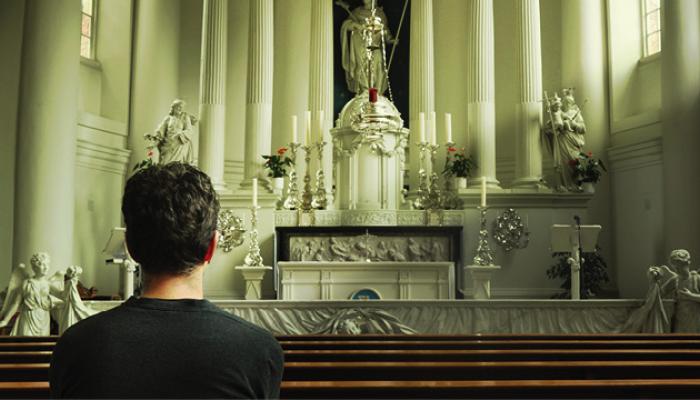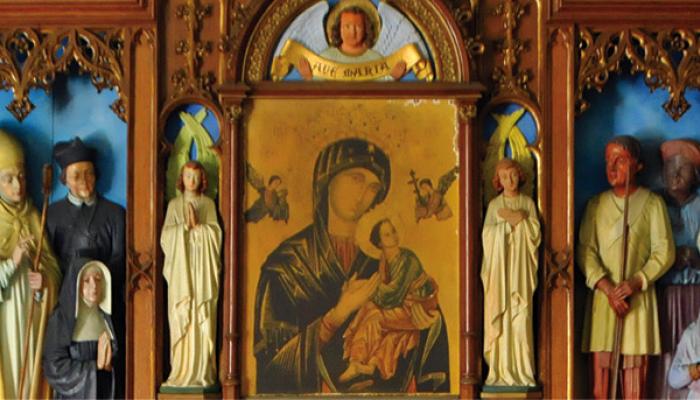
4.18 Çka janë mrekullitë, magjia dhe forcat okulte?
Ndonjëherë Zoti bën mrekulli: ngjarje që nuk përputhen me ligjet e natyrës. Në raste të tilla Zoti vendos të ndërhyjë drejtpërdrejt, megjithëse ligjet e natyrës mbeten në fuqi. Prandaj mrekullitë nuk mund të shpjegohen shkencërisht: ato janë fjalë për fjalë “mbi natyrën”, ose të mbinatyrshme.
Ne nuk e dimë saktësisht pse Zoti ndonjëherë bën mrekulli dhe pse shpesh nuk bën. Ju nuk mund të bëni që të ndodhë një mrekulli, por mund të luteni për të. Nuk ka diçka të tillë si magji “e bardhë” apo “e mirë”. Praktikat okulte dhe magjia janë të rrezikshme për njerëzit dhe në kundërshtim me dashurinë për Zotin.
Si mund ta forcojmë familjaritetin tonë birnor?
Familjariteti birnor vihet në sprovë kur mendojmë se nuk na janë plotësuar lutjet tona. Atëherë duhet të pyesim nëse Hyji është për ne një Atë, vullnesën e të cilit kërkojmë ta përmbushim, apo thjesht një mjet për të marrë atë që duam. Nëse urata jonë bashkohet me atë të Jezusit, e dimë se Ai do të na japë më shumë se këtë ose atë dhuratë: marrim Shpirtin Shenjt, i cili e shndërron zemrën tonë. [KKKP 575]
What happens if you find that prayer does not help?
Prayer does not seek superficial success but rather the Will of God and intimacy with him. God’s apparent silence is itself an invitation to take a step farther—in total devotion, boundless faith, endless expectation. Anyone who prays must allow God the complete freedom to speak whenever he wants, to grant whatever he wants, and to give himself however he wants.
Often we say: I have prayed, but it did not help at all. Maybe we are not praying intensely enough. The saintly Curé of Ars once asked a brother priest who was complaining about his lack of success, “You have prayed, you have sighed … but have you fasted, too? Have you kept vigil?” It could also be that we are asking God for the wrong things. St. Teresa of Avila once said, “Do not pray for lighter burdens; pray for a stronger back.” [Youcat 507]
“You shall not have strange Gods before me.” What does that mean?
This commandment forbids us:
- to adore other gods and pagan deities or to worship an earthly idol or to devote oneself entirely to some earthly good (money, influence, success, beauty, youth, and so on)
- to be superstitious, which means to adhere to esoteric, magic, or occult or New Age practices or to get involved with fortune telling or spiritualism, instead of believing in God’s power, providence, and blessings
- to provoke God by word or deed
- to commit a sacrilege
- to acquire spiritual power through corruption and to desecrate what is holy through trafficking (simony).
[Youcat 355]
Is esotericism as found, for example in New Age beliefs, compatible with the Christian faith?
No. Esotericism ignores the reality of God. God is a personal Being; he is love and the origin of life, not some cold cosmic energy. Man was willed and created by God, but man himself is not divine; rather, he is a creature that is wounded by sin, threatened by death, and in need of redemption. Whereas most proponents of esotericism assume that man can redeem himself, Christians believe that only Jesus Christ and God’s grace redeem them. Nor are nature and the cosmos God (as pantheism claims). Rather, the Creator, even though he loves us immensely, is infinitely greater and unlike anything he has created.
Many people today practice yoga for health reasons, enroll in a meditation course so as to become more calm and collected, or attend dance workshops so as to experience their bodies in a new way. These techniques are not always harmless. Often they are vehicles for doctrines that are foreign to Christianity. No reasonable person should hold an irrational world view, in which people can tap magical powers or harness mysterious spirits and the “initiated” have a secret knowledge that is withheld from the “ignorant”. In ancient Israel, the surrounding peoples’ beliefs in gods and spirits were exposed as false. God alone is Lord; there is no god besides him. Nor is there any (magical) technique by which one can capture or charm “the divine”, force one’s wishes on the universe, or redeem oneself. Much about these esoteric beliefs and practices is superstition or occultism. [Youcat 356]
Në Kuvendin e Shën Damianit , [Shën Klara e Asizit] praktikonte heroikisht virtytet që duhet të dallojnë çdo të krishterë: përulësinë frymën e përshpirtërisë , pendimin dhe bamirësinë ... Besimi i saj në praninë e vërtetë të Krishtit në Eukaristi ishte kaq i madh saqë dy herë ndodhi një mrekulli. Thjesht duke treguar të Shenjtërueshmin Sakrament largoi mercenarët saraçenë, të cilët ishin gati të sulmonin kuvendin e Shën Damianit dhe të plaçkitnin qytetin e Asizit ... Ata që ndryshojnë botën për më mirë janë të shenjtë, ata e shndërrojnë atë përgjithmonë, duke futur në të energjitë që vetëm dashuria e frymëzuar nga Ungjilli mund t’i nxjerrë. Shenjtërit janë dashamirësit e mëdhenj të njerëzimit! [Papa Benedikti, Audienca e përgjithshme, 15 shtator 2010]





